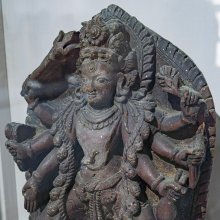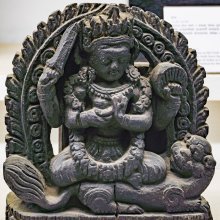Bhavani, Bhavāni, Bhavānī: 20 definitions
Introduction:
Bhavani means something in Hinduism, Sanskrit, the history of ancient India, Marathi, Jainism, Prakrit, Hindi. If you want to know the exact meaning, history, etymology or English translation of this term then check out the descriptions on this page. Add your comment or reference to a book if you want to contribute to this summary article.
Images (photo gallery)
In Hinduism
Shaktism (Shakta philosophy)
Source: Wisdom Library: ŚāktismBhavāni (भवानि, “the giver of existence”).—One of the names of the Goddess, Devī, who is regarded as the female principle of the divine; the embodiement of the energies of the Gods.

Shakta (शाक्त, śākta) or Shaktism (śāktism) represents a tradition of Hinduism where the Goddess (Devi) is revered and worshipped. Shakta literature includes a range of scriptures, including various Agamas and Tantras, although its roots may be traced back to the Vedas.
Purana and Itihasa (epic history)
Source: archive.org: Shiva Purana - English TranslationBhavānī (भवानी) is an epithet of the Goddess (Devī), who incarnated as Satī, according to the Śivapurāṇa 2.2.14. Accordingly as Brahmā narrated to Nārada:—“[...] On seeing the mother of the universe born of Vīriṇī, Dakṣa joined his palms in reverence, paid respects to her and eulogised her. [...] O mother of the universe, those who eulogise Thee with the names of Bhavānī, Ambikā, Jaganmāyā and Durgā will have everything”.
Note: The Goddess has a great variety of names referable to her various forms, attributes and actions but these names are not always used accurately and distinctively. As the wife of God Śiva she is Bhavānī, as the mother of the world she is Ambikā or jaganmātā (the reading jaganmātā for Jaganmāyā is preferable). In her terrible form she is Durgā, the inaccessible.
Source: Cologne Digital Sanskrit Dictionaries: The Purana IndexBhavānī (भवानी).—Umā;1 Parāśakti; enshrined at Sthāneśvara.2
- 1) Bhāgavata-purāṇa III. 23. 1; IV. 5. 1; Brahmāṇḍa-purāṇa III. 9. 1; 41. 42; 43. 1 and 23
- 2) Matsya-purāṇa 13. 31; 101. 16; Vāyu-purāṇa 71. 2.

The Purana (पुराण, purāṇas) refers to Sanskrit literature preserving ancient India’s vast cultural history, including historical legends, religious ceremonies, various arts and sciences. The eighteen mahapuranas total over 400,000 shlokas (metrical couplets) and date to at least several centuries BCE.
Kavya (poetry)
Source: Wisdom Library: KathāsaritsāgaraBhavānī (भवानी) is referred to as the “mother of the three worlds” in the Kathāsaritsāgara, chapter 1, written by Somadeva in the 11th-century. Bhavānī is described as becoming the daughter of Himavat (another form of Himālaya).
The Kathāsaritsāgara (‘ocean of streams of story’), mentioning Bhavānī, is a famous Sanskrit epic story revolving around prince Naravāhanadatta and his quest to become the emperor of the vidyādharas (celestial beings). The work is said to have been an adaptation of Guṇāḍhya’s Bṛhatkathā consisting of 100,000 verses, which in turn is part of a larger work containing 700,000 verses.
Source: Shodhganga: The Kavyamimamsa of RajasekharaBhavānī (भवानी) is the name of an important person (viz., an Ācārya or Kavi) mentioned in Rājaśekhara’s 10th-century Kāvyamīmāṃsā.—It is another name of Pārvatī, who was the creator of Sāhitya-VidyāVadhū.

Kavya (काव्य, kavya) refers to Sanskrit poetry, a popular ancient Indian tradition of literature. There have been many Sanskrit poets over the ages, hailing from ancient India and beyond. This topic includes mahakavya, or ‘epic poetry’ and natya, or ‘dramatic poetry’.
India history and geography
Source: What is India: Annual Report on Indian Epigraphy (1945-1952)Bhavāni is an archaeologically important site situated in Tirevallur-taluk (Chingleput district, Madras), known for inscriptions regarding the ancient history of India. For example, at Bhavāni there is an inscription in the Tamil language on the ceiling of the mahāmaṇḍapa in front of the central shrine, Saṅgameśvara temple. It states that Immaḍi Keṭṭi-mudaliyār constructed the precession-path round the shrine (tirunoḍaimāligai) the front nṛtya-maṇḍapa and the śikhara (pinnacle) of god Naṇṇāvuḍaiyasvāmin and also the central shrine, the ardhamaṇḍapa and the mahāmaṇḍapa of the goddess, Paṇṇārmoily-ammai.

The history of India traces the identification of countries, villages, towns and other regions of India, as well as mythology, zoology, royal dynasties, rulers, tribes, local festivities and traditions and regional languages. Ancient India enjoyed religious freedom and encourages the path of Dharma, a concept common to Buddhism, Hinduism, and Jainism.
Languages of India and abroad
Marathi-English dictionary
Source: DDSA: The Molesworth Marathi and English Dictionarybhavānī (भवानी).—f (S) The goddess Parvati in her pacific form. Pr. savā rupayācī bha0 sōḷā rupayāñcā gōndhaḷa. 2 See bōhaṇī.
Source: DDSA: The Aryabhusan school dictionary, Marathi-Englishbhavānī (भवानी).—f The goddess pārvatī in her pacific form.
Marathi is an Indo-European language having over 70 million native speakers people in (predominantly) Maharashtra India. Marathi, like many other Indo-Aryan languages, evolved from early forms of Prakrit, which itself is a subset of Sanskrit, one of the most ancient languages of the world.
Sanskrit dictionary
Source: DDSA: The practical Sanskrit-English dictionaryBhavānī (भवानी).—Name of Pārvatī, wife of Śiva; आलम्बताग्रकरमत्र भवो भवान्याः (ālambatāgrakaramatra bhavo bhavānyāḥ) Kirātārjunīya 5.29; Kumārasambhava 7.84; Meghadūta 38,46; भवानि स्तोतुं त्वां प्रभवति चतुर्भिर्न वदनैः । प्रजानामीशानस्त्रिपुरमथनः पञ्चभिरपि (bhavāni stotuṃ tvāṃ prabhavati caturbhirna vadanaiḥ | prajānāmīśānastripuramathanaḥ pañcabhirapi) || Ānandalaharī.
Source: Cologne Digital Sanskrit Dictionaries: Shabda-Sagara Sanskrit-English DictionaryBhavānī (भवानी).—f. (-nī) The goddess Parvati or Durga, in her pacific and amiable form. E. bhava Siva. fem. aff. ṅīp, and ānuk augment.
Source: Cologne Digital Sanskrit Dictionaries: Benfey Sanskrit-English DictionaryBhavānī (भवानी).—i. e. bhava + ī, f. The wife of Śiva, [Kirātārjunīya] 5, 29.
Source: Cologne Digital Sanskrit Dictionaries: Cappeller Sanskrit-English DictionaryBhavānī (भवानी).—[feminine] [Name] of a goddess, the wife of Bhava, in [later language] = pārvatī.
Source: Cologne Digital Sanskrit Dictionaries: Monier-Williams Sanskrit-English Dictionary1) Bhavānī (भवानी):—[from bhava] f. ([from] bhava; cf. iṅdrāṇī, rudraṇī, śarvāṇī and, [Pāṇini 4-1, 49]) Name of a goddess identified in later times with Pārvatī (she is the wife of Śiva in her pacific and amiable form; cf. [Religious Thought and Life in India 79]), [Gṛhya-sūtra and śrauta-sūtra; Harivaṃśa] etc.
2) [v.s. ...] of various women, [Catalogue(s)]
3) [v.s. ...] of a river, [cf. Lexicographers, esp. such as amarasiṃha, halāyudha, hemacandra, etc.]
Source: Cologne Digital Sanskrit Dictionaries: Yates Sanskrit-English DictionaryBhavānī (भवानी):—(nī) 3. f. The goddess Durgā in her amiable form.
Source: DDSA: Paia-sadda-mahannavo; a comprehensive Prakrit Hindi dictionary (S)Bhavānī (भवानी) in the Sanskrit language is related to the Prakrit word: Bhavāṇī.
[Sanskrit to German]
Sanskrit, also spelled संस्कृतम् (saṃskṛtam), is an ancient language of India commonly seen as the grandmother of the Indo-European language family (even English!). Closely allied with Prakrit and Pali, Sanskrit is more exhaustive in both grammar and terms and has the most extensive collection of literature in the world, greatly surpassing its sister-languages Greek and Latin.
Hindi dictionary
Source: DDSA: A practical Hindi-English dictionaryBhavānī (भवानी):—(nf) goddess Durga: —spouse of Lord Shiv ([bhava]).
...
Prakrit-English dictionary
Source: DDSA: Paia-sadda-mahannavo; a comprehensive Prakrit Hindi dictionaryBhavāṇī (भवाणी) in the Prakrit language is related to the Sanskrit word: Bhavānī.
Prakrit is an ancient language closely associated with both Pali and Sanskrit. Jain literature is often composed in this language or sub-dialects, such as the Agamas and their commentaries which are written in Ardhamagadhi and Maharashtri Prakrit. The earliest extant texts can be dated to as early as the 4th century BCE although core portions might be older.
Kannada-English dictionary
Source: Alar: Kannada-English corpusBhavāni (ಭವಾನಿ):—[noun] Pārvati, the wife of Śiva.
Kannada is a Dravidian language (as opposed to the Indo-European language family) mainly spoken in the southwestern region of India.
See also (Relevant definitions)
Starts with (+34): Bhavani Ambal, Bhavanibandhana, Bhavanibandhavinashin, Bhavanibhujamga, Bhavanibhujanga, Bhavanidasa, Bhavanidasa cakravartin, Bhavanidasa kaviraja, Bhavanigadanibandhacchedana, Bhavanigadanibandhavinashin, Bhavaniguru, Bhavanika, Bhavanikanta, Bhavanikavaca, Bhavanikavadi, Bhavanike, Bhavanikshepa, Bhavanimata, Bhavanimmita, Bhavaninamasahasrastavaraja.
Ends with: Abhavani, Adibhavani, Ambabhavani, Anubhavani, Bhatakabhavani, Calakabhavani, Caurabhavani, Gamgabhavani, Mangalabhavani, Nagarabhavani, Nibhavani, Tulabhavani, Ubhavani, Udhalabhavani.
Full-text (+50): Bhavanipati, Karnakumari, Bhavaniguru, Bhavanikavadi, Bhutya, Bhavanistavaraja, Bhavanistavashataka, Bhavanivallabha, Bhavanipancanga, Bhavanivilasa, Bhavanibhujamga, Bhavanistotra, Bhavanikavaca, Bhavanipujapaddhati, Bhavanipara, Abhavani, Bhavaninandana, Bhavanisahaya, Bhavanishamkara, Bhavanisakha.
Relevant text
Search found 37 books and stories containing Bhavani, Bhavāni, Bhavānī, Bhāvanī, Bhavāṇī; (plurals include: Bhavanis, Bhavānis, Bhavānīs, Bhāvanīs, Bhavāṇīs). You can also click to the full overview containing English textual excerpts. Below are direct links for the most relevant articles:
Garga Samhita (English) (by Danavir Goswami)
Verse 6.5.20 < [Chapter 5 - The Kidnapping of Śrī Rukmiṇī]
Verses 6.5.23-24 < [Chapter 5 - The Kidnapping of Śrī Rukmiṇī]
Verse 6.5.21 < [Chapter 5 - The Kidnapping of Śrī Rukmiṇī]
Cidgaganacandrika (study) (by S. Mahalakshmi)
Verse 15 [External Manifestations of Bhavāni] < [Chapter 1 - First Vimarśa]
The Devi Bhagavata Purana (by Swami Vijñanananda)
Chapter 5 - On the chanting of hymns by Hara and Brahmā < [Book 3]
Chapter 7 - On the praise of the Devī < [Book 1]
Chapter 4 - On the hymns to the Great Devī by Viṣṇu < [Book 3]
The Linga Purana (by J. L. Shastri)
Chapter 84 - The holy rite of Umā-Maheśvara (umāmaheśvara-vrata) < [Section 1 - Uttarabhāga]
Chapter 87 - Suppression of delusion (muni-moha-śamana) < [Section 1 - Uttarabhāga]
Chapter 102 - The penance of Umā (umāsvayaṃvara) < [Section 1 - Uttarabhāga]
Autumn < [July – September, 2003]
Matri Sharanam < [October – December, 2003]
Reader’s Mail < [January – March, 2008]
The Skanda Purana (by G. V. Tagare)
Chapter 100f - Yātrā Parikrama (pilgrimages) (6): Gaurī Yātrā < [Section 2 - Uttarārdha]
Chapter 61 - The Greatness of Vaiṣṇava Tīrthas < [Section 2 - Uttarārdha]
Chapter 100h - Antargṛha Yātrā < [Section 2 - Uttarārdha]
Related products



